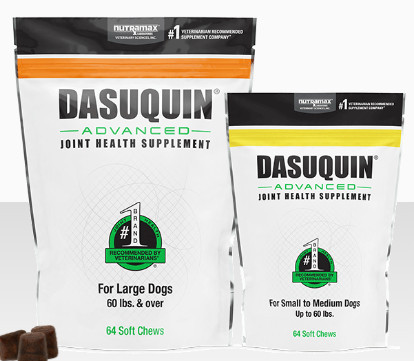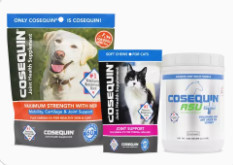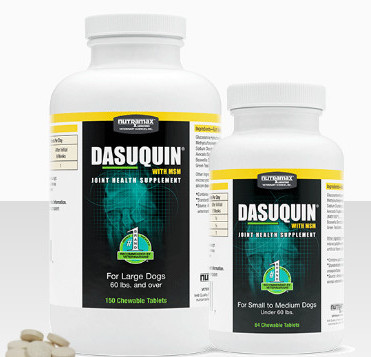My fur baby, Beckham, is beginning to show signs of his senior age (at 10 years old). It is a little harder for him to get up from laying down, as well as getting up onto the bed or the couch. This made me think…are joint supplements beneficial for senior dogs? Are they good for arthritis?
In talking with Beckham’s veterinarian, she says, yes! Joint supplements are beneficial for senior dogs; however there are some things to look for.
Let’s discuss how you can tell if your senior dog has arthritis. What types of joint supplements are available, and what is the best supplement for your dog.
Of course, before you make any decisions, please consult with your veterinarian!
How to Tell if Your Senior Dog has Arthritis
Arthritis is common among senior dogs as well as large breed dogs. Like in humans, their joints can deteriorate and cause pain and mobility issues.
What is Arthritis?
The full name this disease is known by is Osteoarthritis (OA) or Degenerative Joint Disease (DJD). This is an inflammation or degeneration of the joints to where dogs experience pain and inflammation of the joints that interfere with daily activities.
Basically, in healthy dogs, the cartilage acts as a cushion in the joint to allow fluid movement. In OA or DJD, the cartilage is broken down where the joint becomes inflamed, painful, and your dog can lose mobility.`
A veterinarian will diagnose the disease by performing a physical examination and possible over diagnostics such as X-Rays/other imaging. If you are suspicious about arthritis in your dog, please contact your veterinarian to properly diagnose the condition.
Causes of Osteoarthritis
There is no single cause of arthritis; however, there are many determining factors that can be the reason for your dog’s joint pain. Here are a few things to consider:
- Age
- Weight – if your dog is overweight, he or she may be prone to arthritis.
- Body Condition – how is your dog built?
- Activity level – is your dog active or more sedentary?
- Repetitive stress – dogs who compete in agility, flyball, etc can be affected
- Nutrition – do you feed your dog a nutritious diet?
- Orthopedic Surgery – Has your dog had surgery?
- Breed – Is your dog a larger breed? Is his/her breed predispositioned to arthritis?
- Infection – For example – Lyme disease can affect the joints.
Signs to Look For
You know your dog best. Any time they move wrong, cough, or even sneeze, you will be on alert, right? Well, let’s break down a few signs to look for that may be concerning:
It will be difficult to detect signs early on; however, you will possibly see the following in moderate to severe cases:
- Difficulty getting up from laying down
- Stiffness in the joints
- Lethargy (lack of energy)
- Reluctance to do normal activities such as run or jump
- Weight gain
- Loss of muscle mass
- Hard time squatting to urinate
- Irritability
- Crankiness when being petted or touched.
I started noticing Beckham was getting a little more cranky when my youngest son and our puppy, Chai, start to run around the house. When they run by him, he doesn’t get up to play, so he plays the role of “fun police” and barks at them going by.
Beckham also does the old man stance when getting up from laying down or when getting up on the couch. I can tell he is experiencing some stiffness in his back hips and legs. It now takes a little longer for him to do these things, so I decided to talk to his veterinarian regarding joint supplements.
Treatment Options
There are different options you can use; however there is no cure for arthritis. Again…talk to your veterinarian regarding the best options for your dog.
- Diet: It is important that your senior dog is on a proper diet. This will help keep your dog at an ideal weight to help alleviate the pressure off of his or her joints.
- Pain Medications: There are a few options to help alleviate pain. Non-steroidal anti-inflammatory drugs (NSAIDS) are first in line to help.
- A couple options your veterinarian may prescribe are: Carprofen, Deracoxib, Grabiprant, etc.
- On rare occasion, your veterinarian may prescribe corticosteroid such as Gabapentin.
- Chiropractic / Physical Therapy / Acupuncture: In some cases, your veterinarian may recommend physical therapy to help alleviate pain and increase mobility.
- Surgery: Depending on your dog’s arthritis prognosis, the veterinarian may suggest surgery to help with the pain. Surgeries such as total hip replacement or knee replacements may be in line…or even fusion surgeries.
- Supplements: Veterinarians may also recommend joint supplements as they have been known to be a safe, long term treatment for arthritis. These supplements are: Glucosomine, Chondritin, and Green Lipped Mussel (GLM).
So…why supplements? How do they actually help alleviate pain and inflammation due to Osteoarthritis?
What Do Joint Supplements Do to Help Arthritis?
Joint supplements can help reduce the pain and inflammation in your dog’s joints; however, they will not cure the condition. They will help treat symptoms and create an overall better quality of life.
To Consider Before You Buy:
Here are a few points to consider when looking into purchasing joint supplements:
First, they will not work immediately…it takes a little time for the supplement to build up in your dog’s system and can take up to a couple months to see improvement.
Second, they will not work if your dog is obese. The weight on your dog can put a lot of pressure on his or her joints that even with supplements, can be painful. Consider using supplements when your dog is at a healthy weight.
In the last section, I talked about what types of supplements that are beneficial, but let’s take a closer look at Glucosamine, Chondritin, and Green Lipped Mussel. How do they help alleviate the symptoms from OA?
Glucosamine
According to the AKC website, Glucosamine is a naturally occurring compound (made of sugar and amino acids) that can be used to alleviate pain and stiffness. It is made in your dog’s cartilage, but it is also helps rebuild cartilage.
Glucosamine is safe to use long term. It is extracted from crabs, lobster or shrimp shells and will come in 3 types.
Chondritin
Chondritin Sulfate is also a naturally occurring compound that works to stimulate cartilage repair and is used in conjunction with Glucosamine. It can be found in food sources such as fish, bird cartilage, pig trachea and even squid cartilage.
A chondritin sulfate supplement can help hydrate your dog’s cartilage and help keep it from breaking down further. It reduces pain, inflammation, and can help improve mobility.
Green Lipped Mussel
GLM is an extract that comes from New Zealand’s native green lipped mussels, and includes the omega-3 fatty acids, amino acids, antioxidants, and vitamins/minerals. It is used to help protect your dog’s joints and decrease inflammation (and works for humans, too!).
Best Joint Supplements For Your Dog
In my conversation with Beckham’s veterinarian regarding the best joint supplements on the market, she gave me a few pointers. She told me there are only a couple supplements she approves as a lot of products don’t include the quality ingredients needed to actually work. It’s also the fact that certain websites/stores will basically sell anything.
Here are the supplements Dr V approves:
Dasuquin is created to help support normal joint function and stimulate cartilage regeneration. In turn, this will help reduce inflammation and pain for your dog.
Active ingredients:
- Avocado/soybean unsaponifiables: Helps prevent cartilage breakdown
- Boswellia Serrata Extract: Provides additional joint support
- Methylsulfonylmethane: Helps support joint health
- Decaffeinated Green Tea Extract: Helps reduce inflammation
Dasuquin can be found through Chewy.com and Amazon.com and can be purchased without a prescription.
Dasuquin Advanced (RX)
Dasuquin Advanced is the prescription strength version of Dasuquin. You may be able to get this through Chewy.com, but will need a script from your vet. I didn’t see an option online; however, your vet will be able to get it for you.
Active Ingredients:
- Avocado/soybean unsaponifiables: Helps prevent cartilage breakdown
- Boswellia Serrata Extract: Provides additional joint support
- Methylsulfonylmethane: Helps support joint health
- Turmeric: Provides additional joint suport
- Decaffeinated Green Tea Extract: Helps reduce inflammation
- Alpha-Lipoic Acid: Provides anti-oxidant support
- Manganese: Provide support of the cartilage matrix production
- Omega 3 Fatty Acids: Supports overall joint health
Cosequin
Parent Company, Nutramax not only manufactures Dasuquin, but they also developed Cosequin. The largest difference is that Cosequin does not include Avocado/Soybean Unsaponifiables.
Active Ingredients:
- Methylsulfonylmethane: Helps support joint health
- FCHG49® Glucosamine Hydrochloride: Helps support cartilage and connective tissue
- TRH122® Sodium Chondroitin Sulfate: Helps support cartilage and connective tissue
Cosequin can be found through Chewy.com and Amazon.com as well. There are different options available based on your dog’s needs. I am looking at the ones specific to senior dogs and that include MSM and Boswellia.
Conclusion
I think this is a great blog to share especially considering Beckham is getting older (aren’t we all?!) and needs some supplements for his aching bones.
The cool thing about these supplements is they can be used long term and can be found online at reputable websites. They are fairly inexpensive, but they will be beneficial to our dogs so they can live a more healthy/quality life.
I challenge you to check them out! Check out Cosequin and Dasuquin and let me know which one you prefer!
Sources Used:
https://www.akc.org/expert-advice/health/joint-supplements-help-dogs-arthritis/
https://www.orvis.com/giving-joint-supplements-to-older-dogs-with-arthritis.html



